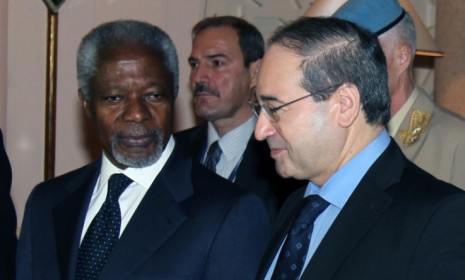America expels Syria's top diplomat: Will it do any good?
With Kofi Annan's ceasefire failing, the U.S. joins an international push to pressure Syria after a gruesome massacre leaves more than 100 villagers dead

The Obama administration expelled Syria's top diplomat from the U.S. on Tuesday, joining an international effort to isolate the country's government following last week's massacre of more than 100 villagers in the Houla region. United Nations envoy Kofi Annan, who brokered a widely ignored ceasefire between the Syrian regime and rebels, called the killings the "tipping point," urged Syrian President Bashar al-Assad to take "bold steps" to end the violence, and then left the country on Wednesday. Will the increased diplomatic pressure help to finally push Assad out of power and stop the Syrian military's attacks against civilians?
Kicking out diplomats accomplished nothing: This diplomatic slap on the wrist won't do any good, says David Atkins at Hullabaloo. "The Assads of the world couldn't care less what anyone thinks of them as long as they don't feel personally threatened." It's time for President Obama and other foreign leaders to "stop the pretenses at outrage" and actually do something to force Syria to stop the murders. Otherwise they might as well just quit pretending they care.
The Week
Escape your echo chamber. Get the facts behind the news, plus analysis from multiple perspectives.

Sign up for The Week's Free Newsletters
From our morning news briefing to a weekly Good News Newsletter, get the best of The Week delivered directly to your inbox.
From our morning news briefing to a weekly Good News Newsletter, get the best of The Week delivered directly to your inbox.
Diplomatic pressure can help ... if it's directed at Russia: Obama isn't the one being feckless, says David Ignatius at The Washington Post. Russian President Vladimir Putin, Assad's last foreign friend, is the one blocking tougher international action against the Syrian regime. The world should turn up the heat on Putin, not Assad, because if the Russian leader joins the diplomatic push, the Syrian regime might buckle. And if he refuses, "the blood of future massacres is on Russia's hands."
"Syria: The blood of future massacres is on Russia's hands"
But this at least tightens the noose on Assad: The coordinated pressure is just one part of the growing "storm of diplomatic protest" against Assad, says David Blair at Britain's The Telegraph. If the massacres don't stop, Annan might explicitly declare the ceasefire he brokered to have failed. If that happens, Assad will really start feeling the heat, as some nations "would consider tightening sanctions on Syria, while some countries would choose to arm the regime's enemies."
"Syrian diplomats expelled in coordinated Western action"
A free daily email with the biggest news stories of the day – and the best features from TheWeek.com
-
 Is Alex Pretti shooting a turning point for Trump?
Is Alex Pretti shooting a turning point for Trump?Today’s Big Question Death of nurse at the hands of Ice officers could be ‘crucial’ moment for America
-
 The best dark romance books to gingerly embrace right now
The best dark romance books to gingerly embrace right nowThe Week Recommends Steamy romances with a dark twist are gaining popularity with readers
-
 The ocean is getting more acidic — and harming sharks’ teeth
The ocean is getting more acidic — and harming sharks’ teethUnder the Radar ‘There is a corrosion effect on sharks’ teeth,’ a study’s author said